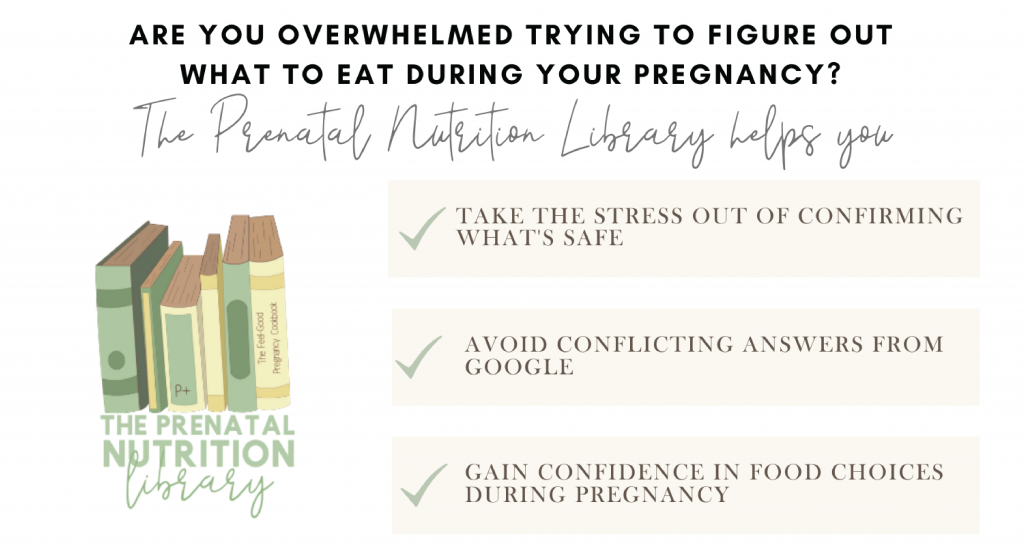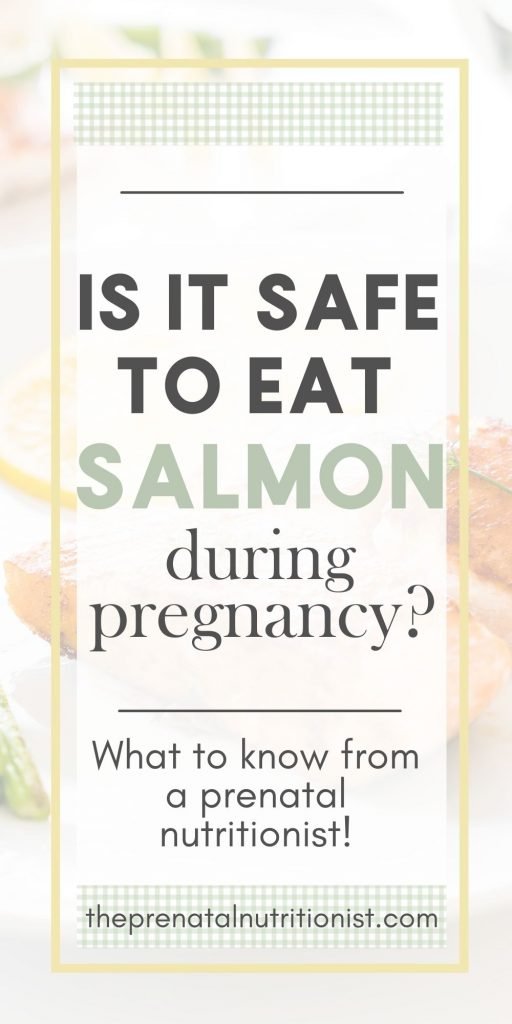
Carefully choosing what you eat (and what you don’t) is essential during pregnancy. Fish is one of the best foods a pregnant woman can eat. Yet, not all fish are created equal. And, not all fish are safe to consume during pregnancy.
Salmon is one of the healthiest fish to consume during pregnancy. It has a TON of nutrients. Salmon contains protein, omega-3s, vitamins, and minerals. Even though this fish is a nutritional powerhouse, there are specific considerations pregnant women should keep in mind before consuming salmon.
So, we’re dedicating a whole post to whether or not salmon is safe to eat during pregnancy. Plus, we’re discussing other important information about salmon that all expectant mothers need to know!
Let’s dive right in!
Is It Safe To Eat Salmon During Pregnancy?
Here at The Prenatal Nutritionist, we get this question: is it safe to eat salmon during pregnancy? And, the answer is: yes!
The best practice for food safety is fully cooked salmon. Fully cooked fish means it reaches a temperature of 145 F. Raw or undercooked salmon carries a greater risk of causing food-borne illness than cooked.
Expectant mothers can eat fully cooked salmon during any trimester. We encourage you to do so if you enjoy it! Feel free to consume at least 2 to 3 4-ounce (oz) servings of oily fish like salmon each week.
Many pregnant women avoid seafood altogether. This is often because they are concerned about toxins, such as mercury. But, many fish, including salmon, are great low-mercury options for pregnancy. This means salmon is an excellent alternative to higher mercury types of fish. Examples of high mercury fish include marlin, king mackerel, and bigeye tuna. These high mercury fish are recommended to avoid during pregnancy.
And don’t even start on all the vitamins and other nutrients in this delicious fish. To name a few, salmon contains iodine, selenium, DHA and EPA, and vitamin B12. These nutrients directly or indirectly contribute to the healthy growth and development of the baby.
To sum it up, salmon is very safe to consume during pregnancy! Salmon has several benefits for both mother and baby. Read on to look at these benefits and some helpful tips and tricks for consuming salmon while pregnant.
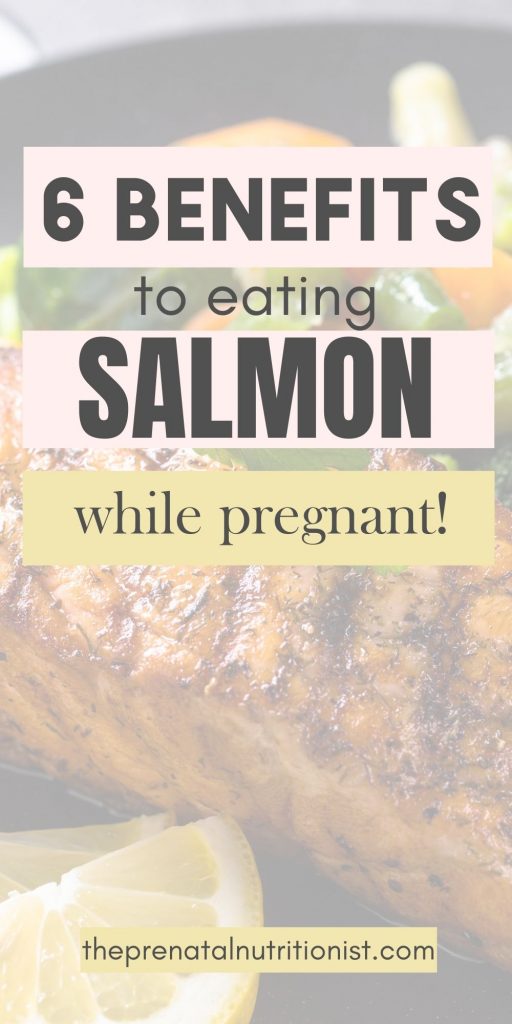
Benefits Of Salmon During Pregnancy
Salmon is a nutrient powerhouse for expectant mothers.
Salmon contains many essential nutrients for mother and baby’s proper growth and development. These include omega-3 fatty acids (DHA and EPA) and vitamins B12, selenium, and iodine. Not to mention salmon contains plenty of protein (about 17-20 grams per 3 oz. serving).
Are you looking for other protein sources during pregnancy that isn’t meat? Check out these vegetarian options!
Salmon supports a baby’s brain development.
The DHA and EPA found in salmon contribute to a baby’s brain’s healthy growth and development. DHA is one of the primary building blocks of a baby’s brain. Several research studies showcase the benefits of maternal omega-3s intake on infants on cognitive abilities. During pregnancy, the placenta transfers nutrients, including DHA, from the mother to the fetus. This means it is essential for pregnant mothers to consume this omega-3s in their diet.
Baby’s brain development is essential! Check out our list of foods for the baby’s brain here.
Salmon supports a baby’s eye development.
Aside from neurological development, the omega-3s found in salmon are also crucial for many other reasons. Omega-3s directly contribute to the development of your baby’s eyes and overall vision. This study found that infants whose mothers consumed plenty of omega-3s during pregnancy showed better vision results than those who did not.
Salmon may reduce the risk of premature birth.
The omega-3 fatty acids in salmon have many purposes, especially when pregnant. They may play a role in reducing the risk of premature birth. Ongoing studies are investigating using omega-3 supplements to help reduce the risk of preterm birth. More research is in the works on this topic.
Salmon is good for your heart health and blood pressure.
You can eat many foods during pregnancy that are good for your heart health, including salmon. The omega-3 healthy fats, DHA and EPA, found in salmon are studied as a way to treat high blood pressure. A good balance of omega-3s to omega-6s in the diet may also help to reduce the risk of preeclampsia.
Salmon may help prevent postpartum depression.
Finally, eating salmon may help to reduce the risk of postpartum depression. Studies show that the omega-3s found in salmon may help reduce and prevent symptoms of common mental health concerns after pregnancy. These include feelings of sadness, loneliness, and depression, as well as anxiety.
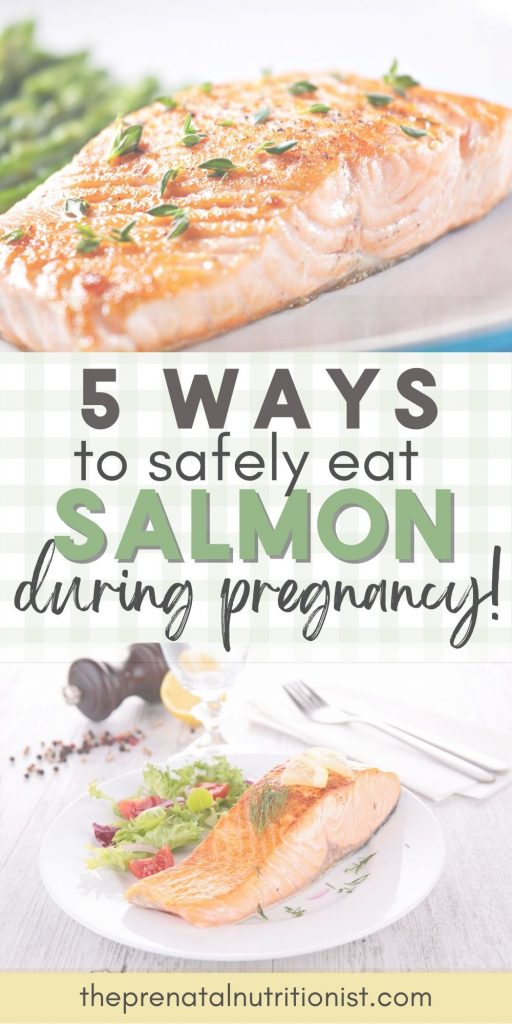
Eating Salmon During Pregnancy
Ensure salmon is cooked thoroughly.
According to the Food and Drug Administration (FDA), salmon is fully cooked once the thickest part of the filet reaches 145° F. Next time salmon is on the lunch or dinner menu, keep your thermometer handy!
Choose high-quality salmon.
As we mentioned before, not all fish are created equal. During pregnancy, we recommend opting for wild-caught salmon when it’s available. Wild-caught salmon tend to have higher levels of healthy omega-3 fatty acids and other nutrients. However, eating any salmon is plentiful and better than skipping altogether.
Implement good food safety practices.
Raw fish is more likely to cause food-borne illnesses like listeriosis. To reduce the risk of exposure, best practice recommends making sure to cook your salmon thoroughly. Additional safety measures include washing your hands thoroughly before and after cooking and using separate cutting boards for fish.
Frozen and canned salmon are nutritious too.
Fresh isn’t the only option when it comes to salmon. Frozen salmon filets and canned salmon are both excellent options for pregnancy! As is hot smoked salmon. Just be sure to cook frozen salmon before eating entirely. Canned salmon can be eaten right out of the can, similar to canned tuna. It’s delicious on crackers or used to make salmon “cakes.”
Store salmon according to proper food safety guidelines.
Back to food safety. Salmon can be stored in the freezer inside airtight packaging. Frozen salmon remains fresh in the freezer for about six months. Thaw frozen salmon in the refrigerator or another safe defrosting method before eating. It is not recommended to thaw sitting out on the countertop.
Salmon can be stored for up to (3) days in the refrigerator before cooking. When storing leftovers, salmon should be placed in a clean, airtight container. Leftovers should be eaten within a few days after cooking.
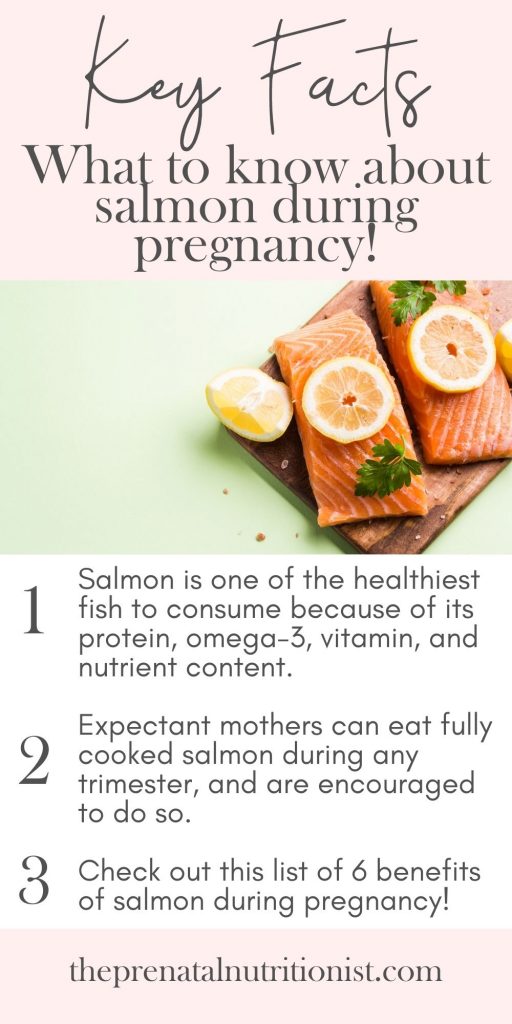
Now that you know salmon is safe to consume during pregnancy, you can add salmon to your pregnancy shopping list today!
There are so many ways to add this ultra-nutritious fish to your diet. Whip up some yummy lemon-herb salmon filets. Make a salmon burger. Add some salmon protein to your next salad. Or, enjoy some fluffy salmon cakes. When it comes to salmon, the options are endless.
For more on which seafood options are safe to consume during pregnancy, click here and check out The Prenatal Nutrition Library! Inside the library, we review the most frequently asked questions on mercury, low mercury fish, tuna, salmon, salmon roe, and more for pregnancy.
Until next time, don’t be afraid to add this delicious and oily fish to your pregnancy diet while keeping those salmon safety tips in mind.
